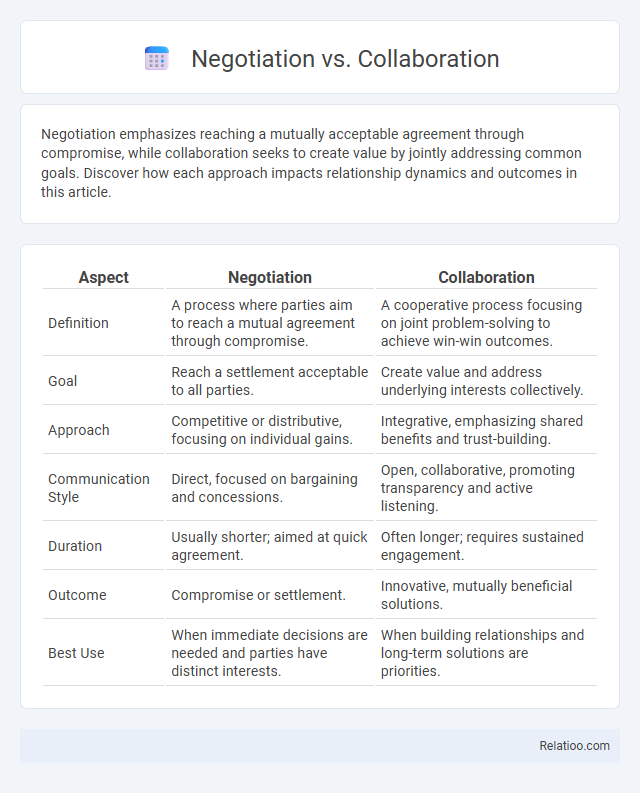Negotiation emphasizes reaching a mutually acceptable agreement through compromise, while collaboration seeks to create value by jointly addressing common goals. Discover how each approach impacts relationship dynamics and outcomes in this article.
Table of Comparison
| Aspect | Negotiation | Collaboration |
|---|---|---|
| Definition | A process where parties aim to reach a mutual agreement through compromise. | A cooperative process focusing on joint problem-solving to achieve win-win outcomes. |
| Goal | Reach a settlement acceptable to all parties. | Create value and address underlying interests collectively. |
| Approach | Competitive or distributive, focusing on individual gains. | Integrative, emphasizing shared benefits and trust-building. |
| Communication Style | Direct, focused on bargaining and concessions. | Open, collaborative, promoting transparency and active listening. |
| Duration | Usually shorter; aimed at quick agreement. | Often longer; requires sustained engagement. |
| Outcome | Compromise or settlement. | Innovative, mutually beneficial solutions. |
| Best Use | When immediate decisions are needed and parties have distinct interests. | When building relationships and long-term solutions are priorities. |
Understanding Negotiation: Definition and Key Concepts
Negotiation is a strategic dialogue between parties aimed at reaching a mutually acceptable agreement by addressing differing interests and finding common ground. Key concepts include BATNA (Best Alternative to a Negotiated Agreement), ZOPA (Zone of Possible Agreement), and the importance of effective communication and compromise. Understanding negotiation involves recognizing power dynamics, managing conflicts, and leveraging negotiation tactics to achieve optimal outcomes in business or personal contexts.
What is Collaboration? Core Principles Explained
Collaboration is the process where individuals or teams work together towards a common goal by sharing knowledge, skills, and resources to achieve optimal outcomes. Core principles of collaboration include open communication, mutual respect, shared responsibility, and collective problem-solving, which foster trust and innovation. Your ability to effectively collaborate enhances productivity and creates a synergistic environment that benefits all participants.
Negotiation vs Collaboration: Key Differences
Negotiation involves parties with differing interests seeking a compromise or agreement through dialogue and concessions, often aiming for a win-win or win-lose outcome. Collaboration emphasizes working jointly toward a common goal, fostering trust, open communication, and shared responsibility to achieve mutually beneficial results. While negotiation tends to focus on resolving conflicts between distinct positions, collaboration prioritizes synergy and co-creation to maximize collective value.
When to Use Negotiation Over Collaboration
Negotiation is ideal when your goals or interests directly conflict with others, requiring a structured give-and-take to reach a mutually acceptable solution. Collaboration suits situations where shared objectives and teamwork can drive innovation and consensus without compromising key priorities. You should use negotiation over collaboration when time constraints, power imbalances, or divergent priorities make consensus difficult, ensuring your needs are clearly defended and met.
The Benefits of Negotiation in Conflict Resolution
Negotiation in conflict resolution facilitates mutually beneficial agreements by fostering open communication and understanding between parties, which reduces misunderstandings and builds trust. It enables the identification of shared interests and creative solutions, leading to sustainable and satisfactory outcomes for all involved. Effective negotiation minimizes prolonged disputes and enhances relationships by encouraging cooperation rather than competition.
The Advantages of Collaborative Approaches
Collaborative approaches in negotiation and prioritization foster open communication, leading to mutually beneficial outcomes and stronger relationships. Your team can leverage diverse perspectives to generate innovative solutions and ensure that all stakeholders feel valued and heard. This synergy enhances decision-making efficiency and drives long-term success by aligning goals and resources effectively.
Skills Required: Negotiators vs Collaborators
Negotiators require strong persuasion, active listening, and strategic thinking skills to reach mutually beneficial agreements while managing conflicts effectively. Collaborators excel in empathy, open communication, and teamwork, fostering trust and shared goals to create innovative solutions. Your ability to prioritize tasks depends on critical decision-making and time management skills, balancing these approaches for optimal outcomes.
Challenges and Pitfalls in Negotiation and Collaboration
Negotiation often faces challenges such as misaligned goals, communication breakdowns, and power imbalances, leading to stalemates or suboptimal agreements. Collaboration pitfalls include unclear roles, lack of trust, and insufficient coordination, which can result in inefficiency and conflict. Both processes require strategic communication and mutual understanding to overcome obstacles and achieve shared objectives.
Hybrid Approaches: Combining Negotiation and Collaboration
Hybrid approaches blend negotiation and collaboration to optimize decision-making and conflict resolution by leveraging the strengths of both methods. You can achieve mutually beneficial outcomes by actively engaging stakeholders in collaborative dialogue while strategically negotiating to address competing interests. This combination enhances trust, fosters creativity, and promotes efficient prioritization of resources and goals.
Choosing the Right Strategy for Successful Outcomes
Choosing the right strategy between negotiation, collaboration, and prioritization depends on your specific goals and the context of the situation. Negotiation involves reaching a compromise when interests differ, collaboration fosters joint problem-solving for mutual benefit, and prioritization helps you focus resources on the most critical tasks. Understanding when to apply each approach enhances your ability to achieve successful outcomes efficiently.

Infographic: Negotiation vs Collaboration
 relatioo.com
relatioo.com